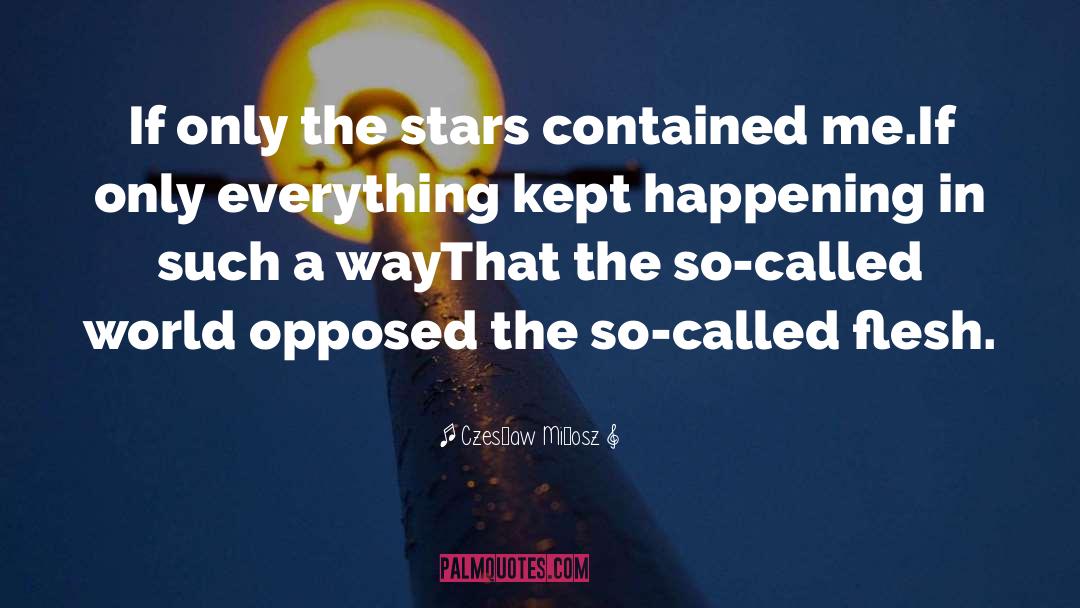Czesław Miłosz Famous Quotes
Reading Czesław Miłosz quotes, download and share images of famous quotes by Czesław Miłosz. Righ click to see or save pictures of Czesław Miłosz quotes that you can use as your wallpaper for free.
In 1942 in Warsaw, we were living without hope, or rather on a hope we knew to be a delusion.
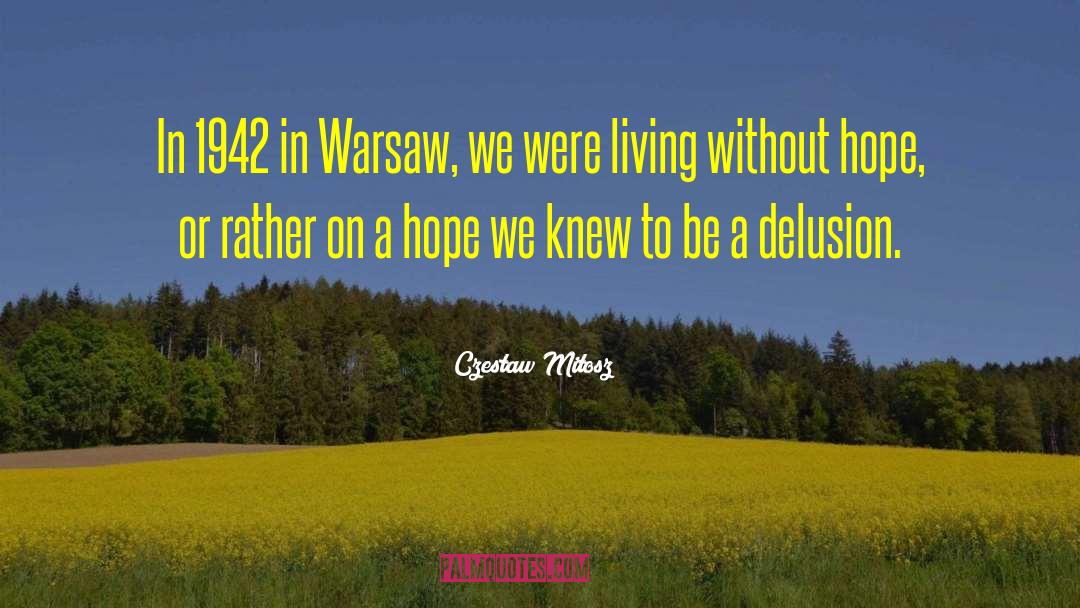
Man tends to regard the order he lives in as natural. The houses he passes on his way to work seem more like rocks rising out of the earth than like products of human hands. He considers the work he does in his office or factory as essential to the harmonious functioning of the world. The clothes he wears are exactly what they should be, and he laughs at the idea that he might equally well be wearing a Roman toga or medieval armor. He respects and envies a minister of state or a bank director, and regards the possession of a considerable amount of money the main guarantee of peace and security. He cannot believe that one day a rider may appear on a street he knows well, where cats sleep and children play, and start catching passers-by with his lasso. He is accustomed to satisfying those of his physiological needs which are considered private as discreetly as possible, without realizing that such a pattern of behavior is not common to all human societies. In a word, he behaves a little like Charlie Chaplin in The Gold Rush, bustling about in a shack poised precariously on the edge of a cliff.
His first stroll along a street littered with glass from bomb-shattered windows shakes his faith in the "naturalness" of his world. The wind scatters papers from hastily evacuated offices, papers labeled "Confidential" or "Top Secret" that evoke visions of safes, keys, conferences, couriers, and secretaries. Now the wind blows them through the street for anyone to read; yet no
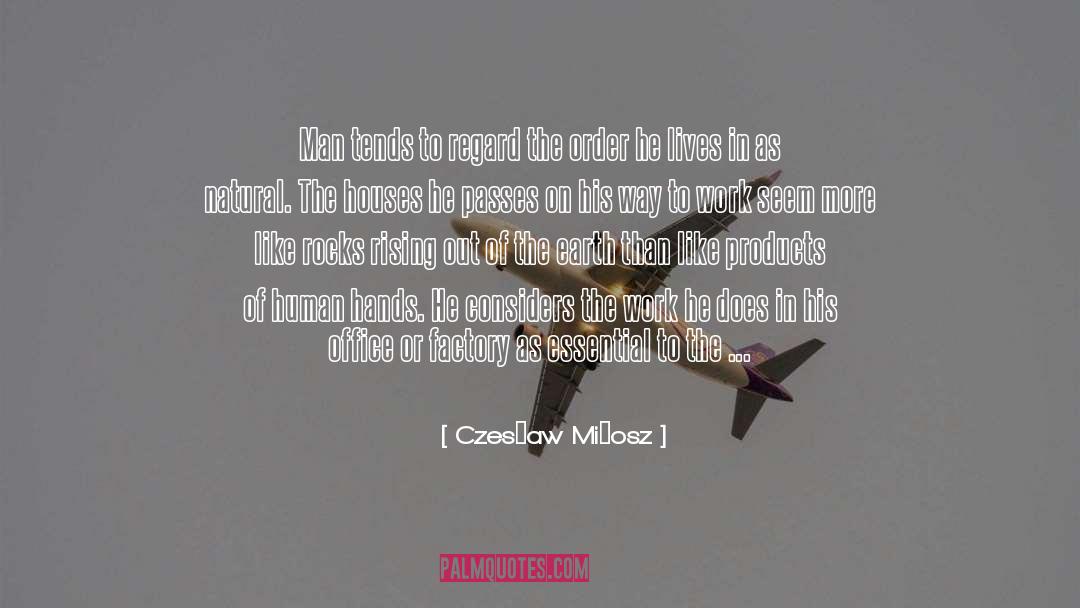
A Song for the End of the World"
On the day the world ends
A bee circles a clover,
A fisherman mends a glimmering net.
Happy porpoises jump in the sea,
By the rainspout young sparrows are playing
And the snake is gold-skinned as it always should be.
On the day the world ends
Women walk through the fields under their umbrellas,
A drunkard grows sleepy at the edge of a lawn,
Vegetable peddlers shout in the street
And a yellow-sailed boat comes nearer the island,
The voice of a violin lasts in the air
And leads into a starry night.
And those who expected lightning and thunder
Are disappointed.
And those who expected signs and archangels' trumps
Do not believe it is happening now.
As long as the sun and the moon are above,
As long as the bumblebee visits a rose,
As long as rosy infants are born
No one believes it is happening now.
Only a white-haired old man, who would be a prophet
Yet is not a prophet, for he's much too busy,
Repeats while he binds his tomatoes:
There will be no other end of the world,
There will be no other end of the world.
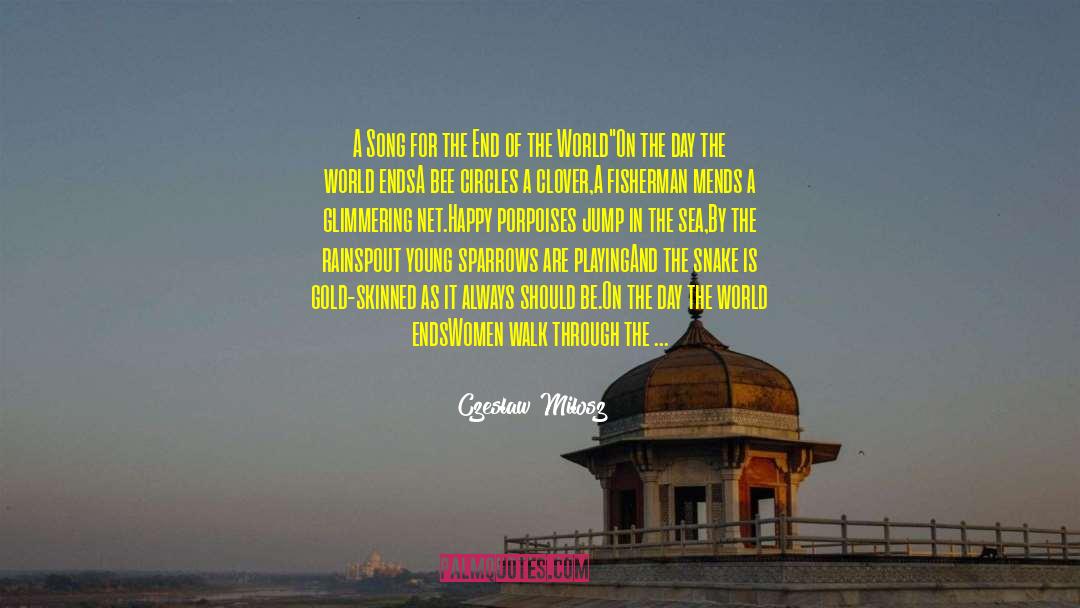
This World"
It appears that it was all a misunderstanding.
What was only a trial run was taken seriously.
The rivers will return to their beginnings.
The wind will cease in its turning about.
Trees instead of budding will tend to their roots.
Old men will chase a ball, a glance in the mirror–
They are children again.
The dead will wake up, not comprehending.
Till everything that happened has unhappened.
What a relief! Breathe freely, you who have suffered much.
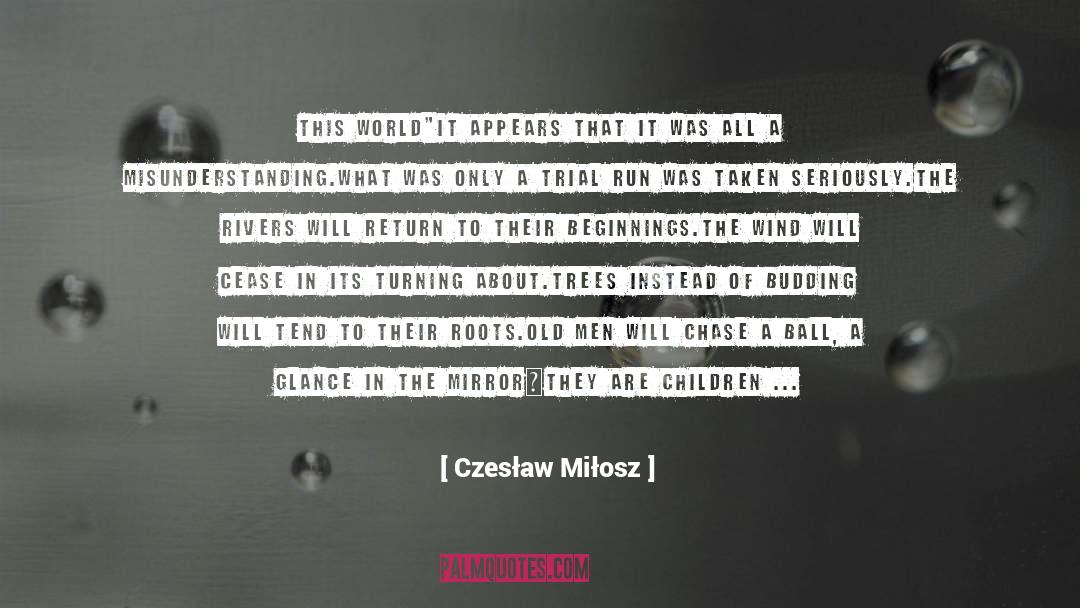
It appears" title="Czesław Miłosz Quotes: This World"
It appears" width="913px" height="515px" loading="lazy"/>
I have heard that voice many a time when asleep
and, what is strange, I understood more or less
an order or an appeal in an unearthly tongue:
day draws near
another one
do what you can.
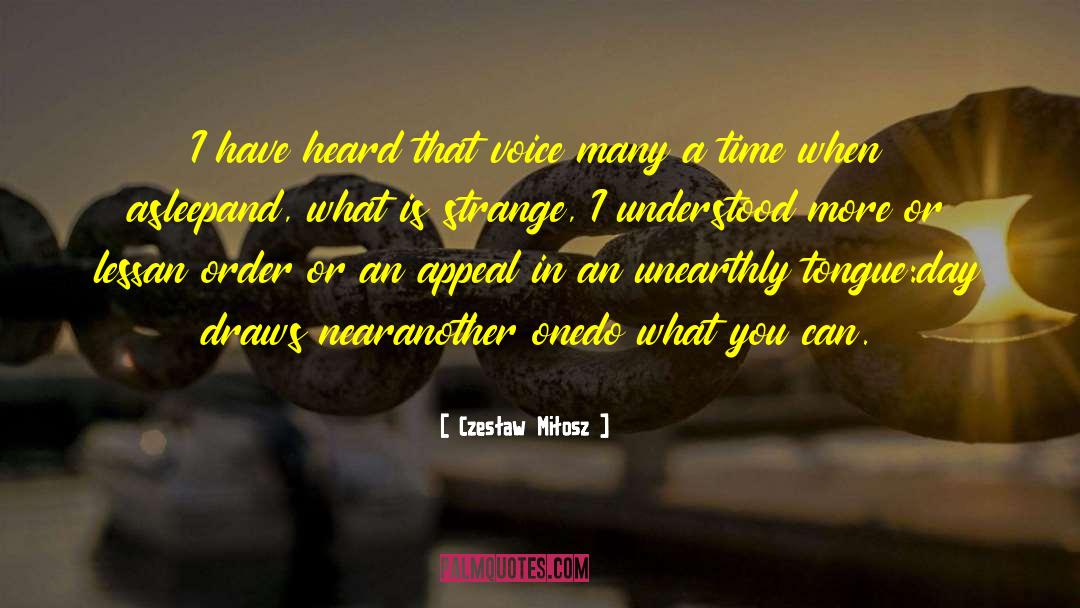
But there is nothing in me, just fear,
nothing but the running of dark waves.
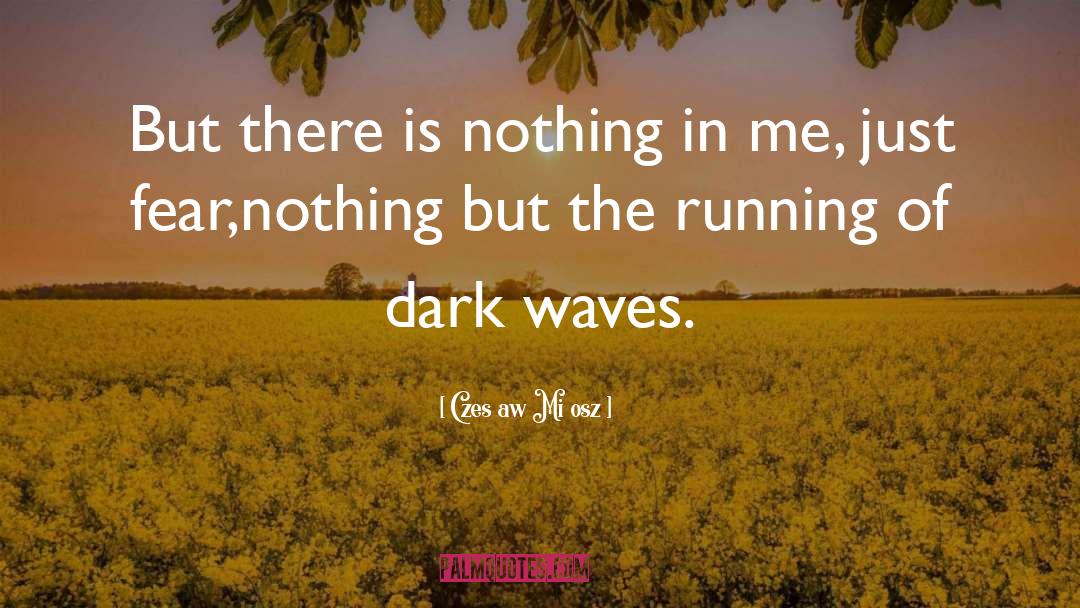
The War broke out, and our city and country became a part of Hitler's Imperium. For five and a half years we lived in a dimension completely different from that which any literature or experience could have led us to know. What we beheld surpassed the most daring and the most macabre imagination. Descriptions of horrors known to us of old now made us smile at their naivete. German rule in Europe was ruthless, but nowhere so ruthless as in the East, for the East was populated by races which, according to the doctrines of National Socialism, were either to be utterly eradicated or else used for heavy physical labor. The events we were forced to participate in resulted from the effort to put these doctrines into practice.
Still we lived; and since we were writers, we tried to write. True, from time to time one of us dropped out, shipped off to a concentration camp or shot. There was no help for this. We were like people marooned on a dissolving floe of ice; we dared not think of the moment when it would melt away.
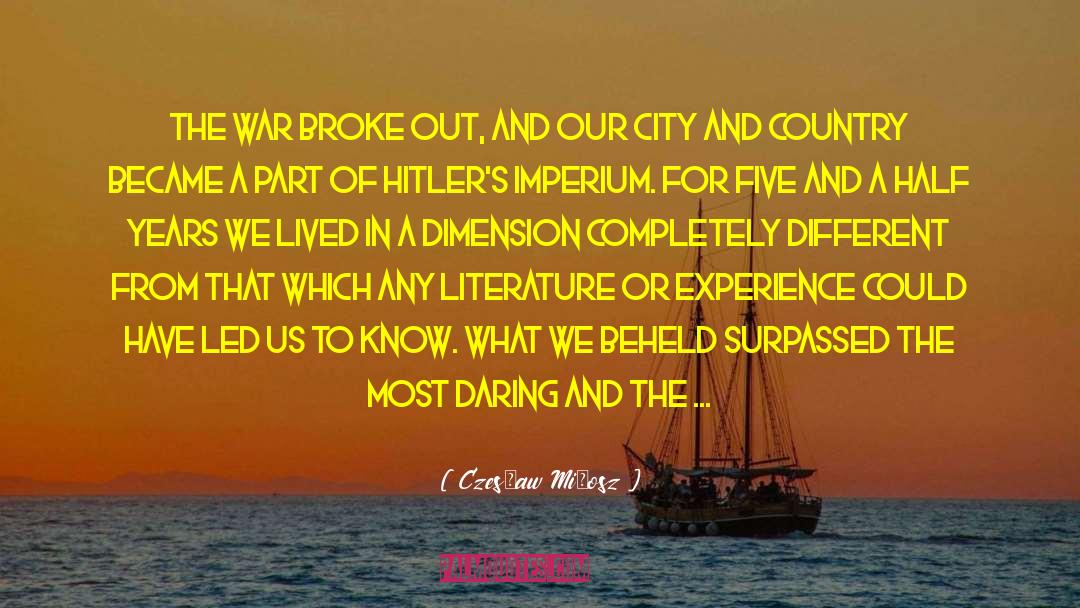
Though not for certain, perhaps in some other year,
It shall come to completion in the sixth millennium, or next Tuesday.
The demiurge's workshop will suddenly be stilled. Unimaginable silence.
And the form of every single grain will be restored in glory.
I was judged for my despair because I was unable to understand this.
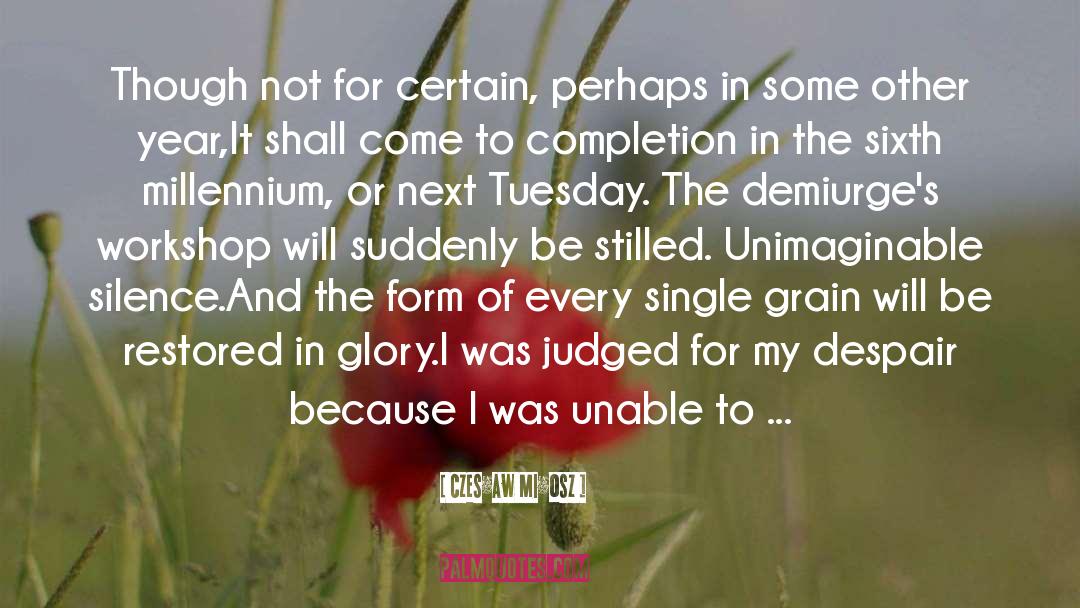
This I wanted and nothing more. In my old age
like old Goethe to stand before the face of the earth,
and recognize it and reconcile it
with my work built up, a forest citadel
on a river of changeable lights and brief shadows.
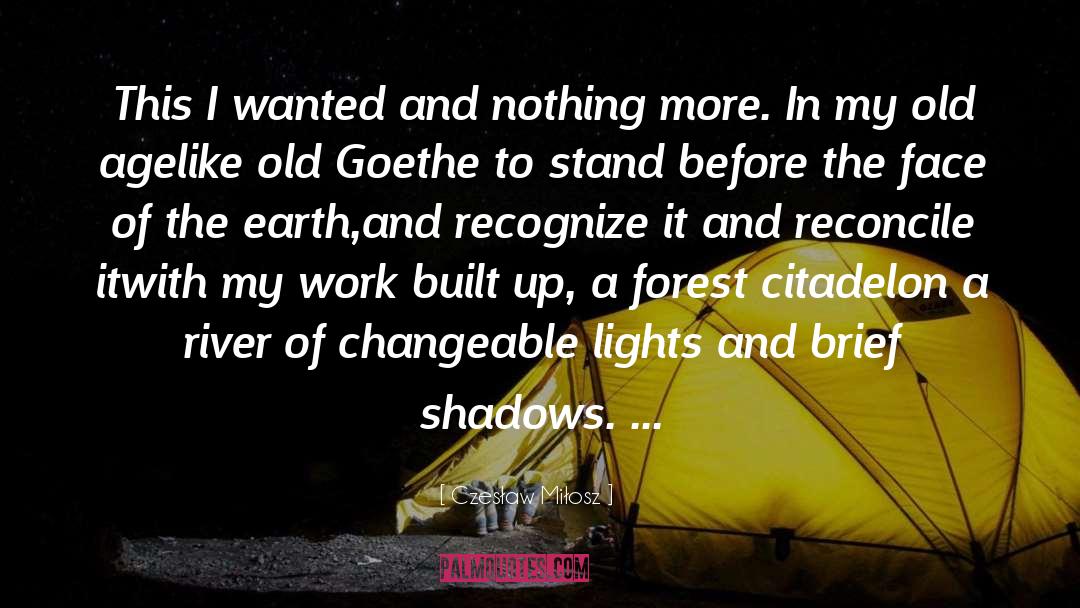
The pressure of an all-powerful totalitarian state creates an emotional tension in its citizens that determines their acts. When people are divided into "loyalists" and "criminals" a premium is placed on every type of conformist, coward, and hireling; whereas among the "criminals" one finds a singularly high percentage of people who are direct, sincere, and true to themselves. From the social point of view these persons would constitute the best guarantee that the future development of the social organism would be toward good. From the Christian point of view they have no other sin on their conscience save their contempt for Caesar, or their in correct evaluation of his might.
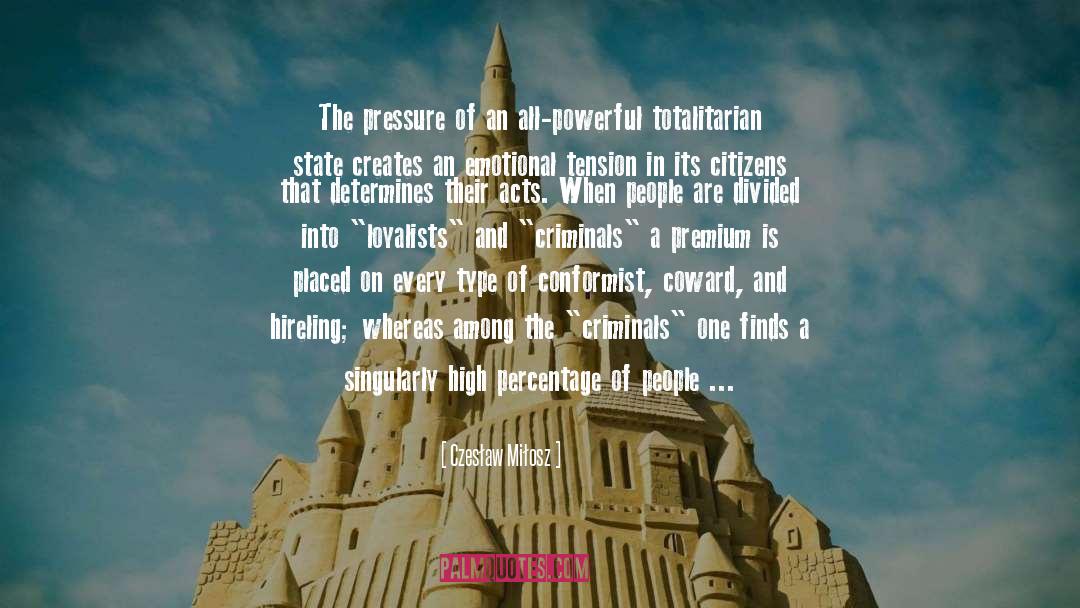
Regret, to no end, in every hour
Of a long life. What beautiful work
Will redeem the heartbeats of a living creature
And what use to confess deeds that last forever?
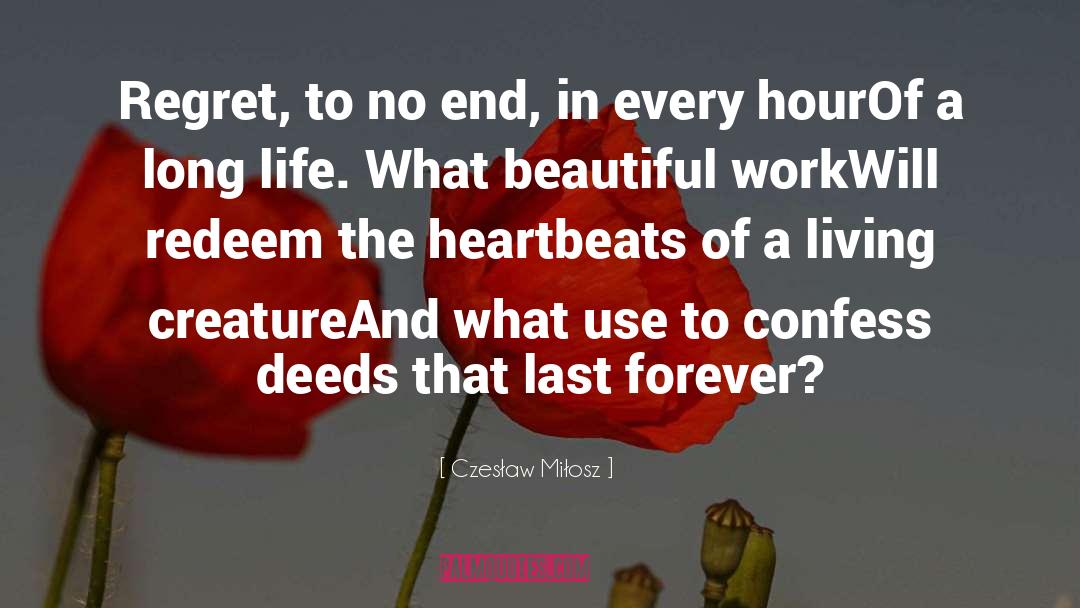
To be a man and live among men is miraculous, even if we know the vile deeds and crimes that people are capable of. Every day we build together an enormous beehive with our thoughts, discoveries, inventions, works, lives. Even that analogy is hardly accurate; it is too static, since our collective work is constantly changing and displaying itself in various colors, subject to time or history. Again, this is an insufficient description, because it ignores the most important thing: that this collective creation is given life by the most private, hidden fuel of all individual aspirations and decisions. The oddity of man's exceptional calling rests principally on his being a comical being, forever immature, so that a group of children with their easy mood swings from laughter to crying is the best illustration of his lack of dignity. A few years pass, and suddenly they are adults, taking control and supposedly prepared to make pronouncements on public matters and even to take upon themselves the duties of father and mother, although it would be good if they first had an entire life of their own to prepare for this.
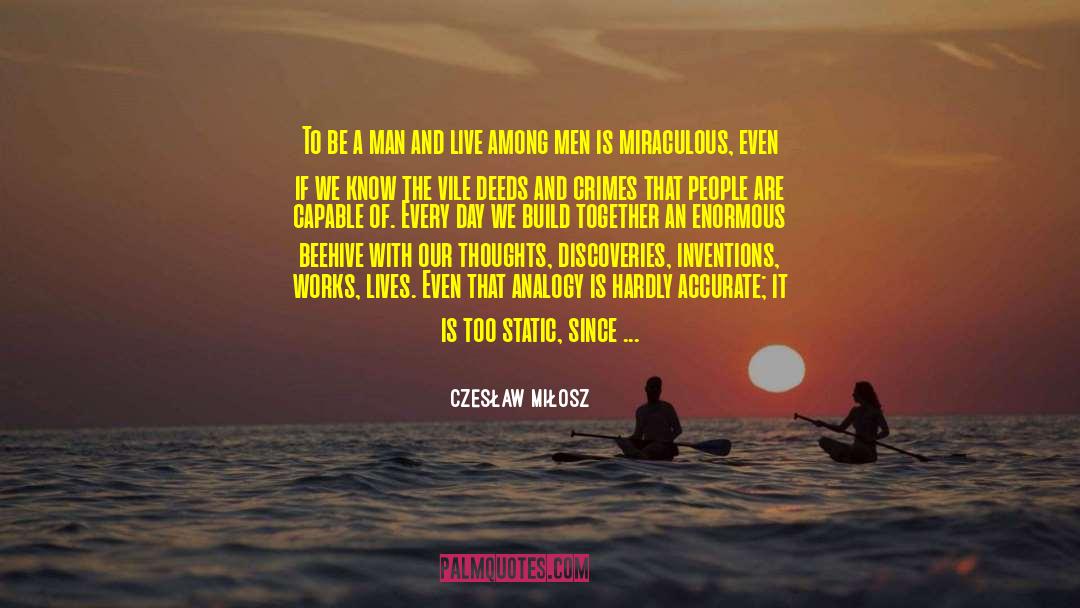
How to resist nothingness? What power
Preserves what once was, if memory does not last?
For I remember little. I remember so very little.
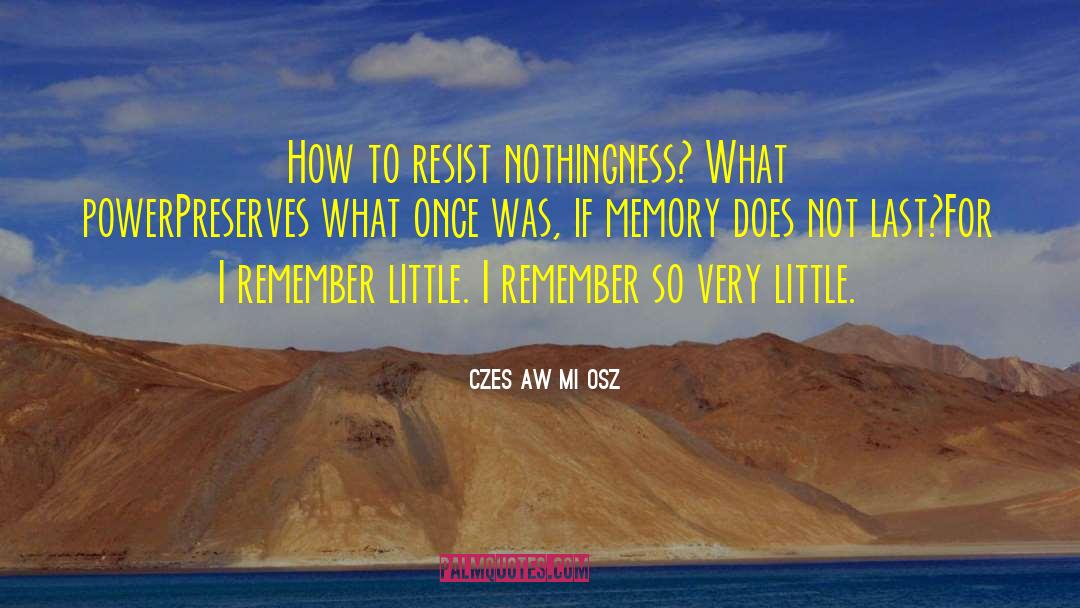
1. That reason is a gift of God and that we should believe in its ability to comprehend the world.
2. That they have been wrong who undermined confidence in reason by enumerating the forces that want to usurp it: class struggle, libido, will to power.
3. That we should be aware that our being is enclosed within the circle of its perceptions, but not reduce reality to dreams and the phantoms of the mind.
4. That truth is a proof of freedom and that the sign of slavery is the lie.
5. That the proper attitude toward being is respect and that we must, therefore, avoid the company of people who debase being with their sarcasm, and praise nothingness.
6. That, even if we are accused of arrogance, it is the case that in the life of the mind a strict hierarchy is necessary.
7. That intellectuals in the twentieth century were afflicted with the habit of baratin, i.e., irresponsible jabber.
8. That in the hierarchy of human activities the arts stand higher than philosophy, and yet bad philosophy can spoil art.
9. That the objective truth exists; namely, out of two contrary assertions, one is true, one false, except in strictly defined cases when maintaining contradiction is legitimate.
10. That quite independently of the fate of religious denominations we should preserve a "philosophical faith," i.e., a belief in transcendence as a measure of humanity.
11. That time excludes an
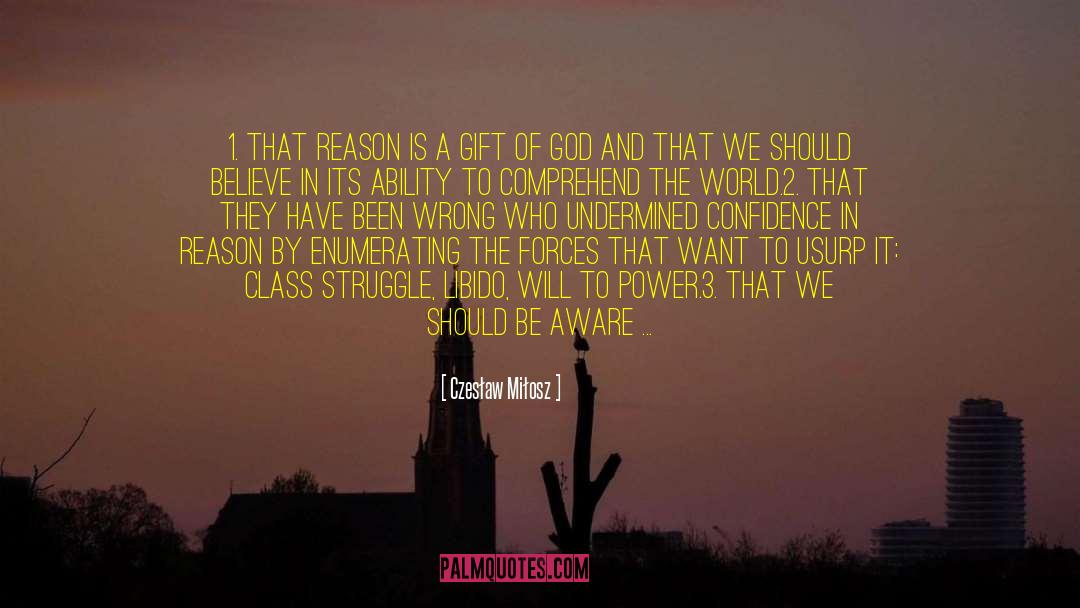
At the same time, he expressed accurately and powerfully the state of mind of the countless underground fighters dying in the battle against Nazism. Why did they throw their lives into the scale? Why did they accept torture and death? They had no point of support like the Fuhrer for the Germans or the New Faith for the Communists. It is doubtful whether most of them believed in Christ. It could only have been loyalty, loyalty to something called fatherland or honor, but something stronger than any name. In one of his stories, a young boy, tortured by the police and knowing that he will be shot, gives the name of his friend because he is afraid to die alone. They meet before the firing squad, and the betrayed forgives his betrayer. This forgiveness cannot be justified by any utilitarian ethic; there is no reason to forgive traitors. Had this story been written by a Soviet author, the betrayed would have turned away with disdain from the man who had succumbed to base weakness.
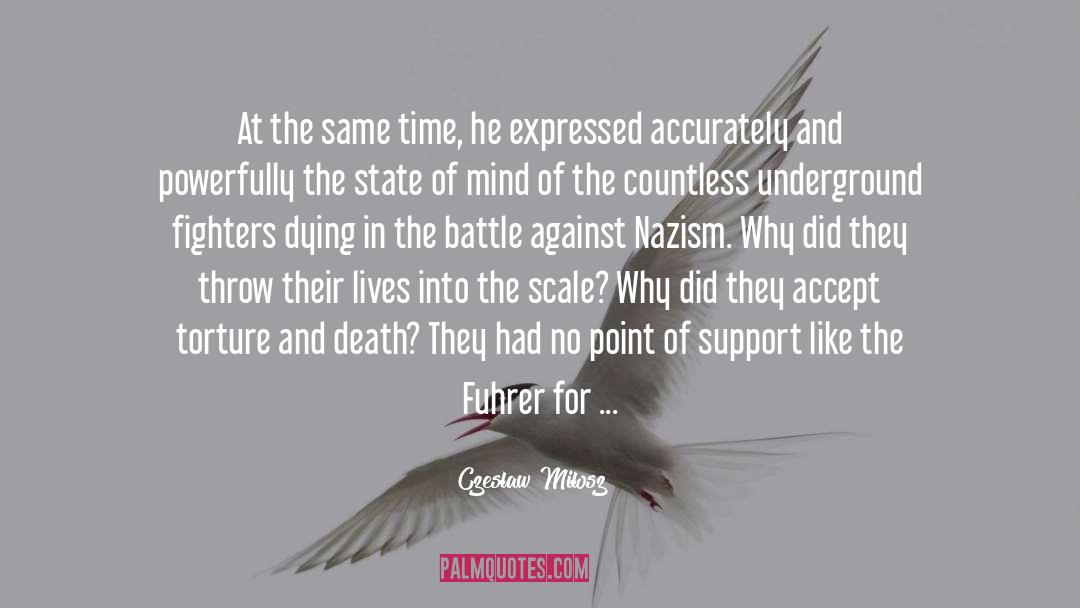
If only the stars contained me.
If only everything kept happening in such a way
That the so-called world opposed the so-called flesh.
